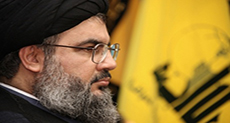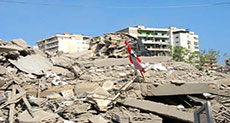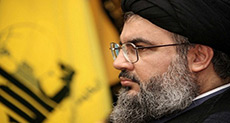Moqawama, Hizbullah΄s Winning Strategy during Lebanon War

Source: Al-Manar TV, 9-10-2008
Two Years and few months have passed on the Second Lebanon War and the "Israeli" army, officials, military analysts and media are still trying to figure out what really happened during that war and still trying to find out the gaps that led to the defeat of the most powerful army in the Middle East, which was used to be called "the undefeatable army".
In his latest analysis, and not the last, "Israeli" journalist Ron Ben-Yishai wrote an interesting analysis in the "Israeli" electronic site "Ynet" on Thursday under the title "In Search of a Winning Strategy", in which he started with the "Israeli" defeat in Yom Kippur in 1973 and ended with the Second Lebanon War in 2006.
Ben-Yishai says that the State of "Israel's" security situation this Yom Kippur is seemingly reasonable, even though a grave threat the likes of which had never threatened the "Israeli" home front is taking shape on the horizon. However, on all the frontlines and in the territories relative calm prevails at this time.
He says, "The war tensions that prevailed a year ago at this time in the wake of the strike on the Syrian nuclear site had greatly dissipated." He adds that the only exception was of Hizbullah's intention to avenge the assassination of its military commander Imad Moghnieh (Hajj Redwan); at this time there is nothing that may spark a large-scale confrontation in the immediate future.
"Even more encouraging is the fact that this situation is not prompting "Israel's" security establishment to delude itself. Top defense officials, just like the citizen on the street, are convinced that this relative quiet will not last long."
He continues that contrary to the arrogance that characterized the "Israeli" army and political leadership 35 years ago, on the eve of the Yom Kippur War, this year the defense establishment shows a high level of readiness and is in the midst of intense work: The army is vigorously working to correct the flaws in capabilities and values exposed during the Second Lebanon War; the military's buildup ahead of future challenges is proceeding at a reasonable pace; most areas that are the responsibility of the Shin Bet and Mossad are being handled with praiseworthy efficiency and professionalism; and even the government somewhat improved its decision-making abilities on the security front over the past year.
Ben-Yishai says that despite this readiness, there is still no guarantee that "Israel" can cope with the growing strategic threat on its very existence.
He says that they lack today "a winning strategy". Such strategy would enable "Israelis" to successfully cope with the "slow destruction" strategy used by Iran, Syria, and Islamic resistance elements to undermine "Israel's" staying power.
According to the "Israeli" journalist, Hizbullah utilized this strategy with a great degree of success during the Second Lebanon War and name it: Moqawama ("Resistance" in Arabic.)
He says, "In its current format, the Moqawama identifies three "Israeli" vulnerabilities: The civilian home front, the "Israeli" public's sensitivity to civilian causalities and even more so to IDF ("Israeli" occupation army) casualties, and the sensitivity of our political leaders to international public opinion and to the pressures exerted by bereaved families, captives' families, and the media."
UNDERGROUND FORTIFICATIONS, TUNNELS, AND BOMBS
"The Moqawama also takes into account the "Israeli" army's relative advantage in accurate air power, the maneuvering and attack abilities of ground forces, and the ability to acquire accurate intelligence information. As a result, Islamic resistance has upgraded the Moqawama strategy and premised it on the means and principles that enable its users to powerfully hit "Israel's" weak spots while minimizing or annulling "Israel's" military advantages: Missiles and ground-to-ground rockets, fired by the dozens and hundreds out of well-hidden sites and civilian population centers, mostly with the aim of disrupting the daily and economic routine and put "Israelis" in an ongoing state of anxiety. This move also aims to disrupt the "Israeli" army's ability to call up reserve forces and use its aircraft."
Ben-Yishai continues, "Other means include Russian-made anti-aircraft weapons systems that to some extent are immune to disruption... Meanwhile, huge quantities of advanced anti-tank rockets are aimed at targeting "Israel's" armored corps until heavy casualties prompt "Israeli" public opinion to press the government to end operations."
"Maintaining launching capabilities over time is the main achievement the Moqawama aspires for. The main operational tactics are as follows: Launches, fortification and combat out of civilian population centers; avoidance of direct clashes with "Israeli" troops, while maintaining constant evasion; causing casualties and moral setbacks to "Israeli" forces and the home front; threatening the "Israeli" army with confrontation in one arena, Lebanon for example, should it decisively operate in another theater, like Gaza."
EXPECTING "ISRAELIS" COLLAPSE
The report says, "All of the above does not aim to prompt "Israel's" surrender at once, but rather, to exhaust it time after time, round by round, until it collapses on its own. Iran's nuclear weapons have an important role to play in this strategy."
"Besides that, for the time being at least, it is quiet clear that the Ayatollahs and even Ahmadinejad believe that "Israel's" collapse and disappearance are nearing as result of the blows delivered against it by the Moqawama, and as result of the leadership and moral crisis it currently faces, with no way out. Therefore, there is no need to get entangled in a nuclear adventure - all that is needed is some patience. Yet even without using nuclear weapons, if and when Iran acquires them, Moqawama groups and Syria would enjoy greater freedom to utilize the strategy. "Israel"'s ability to respond would be limited, which would serve to boost the sense of helplessness and anxiety among our citizens."
This strategy was not devised by an ingenious Islamic planner. It emerged out of trial and error since the 1970s: The Katyusha rockets and infiltrations from Lebanon, and later the fighting in the South Lebanese security zone; the missiles fired at "Israel" in the First Gulf War; the intifadas; and the latest upgrade - the Second Lebanon War.
Ben- Yishai concludes his report saying, "What's amazing is that after so many years of contending with the Moqawama, the "Israeli" Army, other security branches, and "Israel's" political leadership have been unable to formulate a strategy and an arsenal of means that would enable us to win."
Two Years and few months have passed on the Second Lebanon War and the "Israeli" army, officials, military analysts and media are still trying to figure out what really happened during that war and still trying to find out the gaps that led to the defeat of the most powerful army in the Middle East, which was used to be called "the undefeatable army".
In his latest analysis, and not the last, "Israeli" journalist Ron Ben-Yishai wrote an interesting analysis in the "Israeli" electronic site "Ynet" on Thursday under the title "In Search of a Winning Strategy", in which he started with the "Israeli" defeat in Yom Kippur in 1973 and ended with the Second Lebanon War in 2006.
Ben-Yishai says that the State of "Israel's" security situation this Yom Kippur is seemingly reasonable, even though a grave threat the likes of which had never threatened the "Israeli" home front is taking shape on the horizon. However, on all the frontlines and in the territories relative calm prevails at this time.
He says, "The war tensions that prevailed a year ago at this time in the wake of the strike on the Syrian nuclear site had greatly dissipated." He adds that the only exception was of Hizbullah's intention to avenge the assassination of its military commander Imad Moghnieh (Hajj Redwan); at this time there is nothing that may spark a large-scale confrontation in the immediate future.
"Even more encouraging is the fact that this situation is not prompting "Israel's" security establishment to delude itself. Top defense officials, just like the citizen on the street, are convinced that this relative quiet will not last long."
He continues that contrary to the arrogance that characterized the "Israeli" army and political leadership 35 years ago, on the eve of the Yom Kippur War, this year the defense establishment shows a high level of readiness and is in the midst of intense work: The army is vigorously working to correct the flaws in capabilities and values exposed during the Second Lebanon War; the military's buildup ahead of future challenges is proceeding at a reasonable pace; most areas that are the responsibility of the Shin Bet and Mossad are being handled with praiseworthy efficiency and professionalism; and even the government somewhat improved its decision-making abilities on the security front over the past year.
Ben-Yishai says that despite this readiness, there is still no guarantee that "Israel" can cope with the growing strategic threat on its very existence.
He says that they lack today "a winning strategy". Such strategy would enable "Israelis" to successfully cope with the "slow destruction" strategy used by Iran, Syria, and Islamic resistance elements to undermine "Israel's" staying power.
According to the "Israeli" journalist, Hizbullah utilized this strategy with a great degree of success during the Second Lebanon War and name it: Moqawama ("Resistance" in Arabic.)
He says, "In its current format, the Moqawama identifies three "Israeli" vulnerabilities: The civilian home front, the "Israeli" public's sensitivity to civilian causalities and even more so to IDF ("Israeli" occupation army) casualties, and the sensitivity of our political leaders to international public opinion and to the pressures exerted by bereaved families, captives' families, and the media."
UNDERGROUND FORTIFICATIONS, TUNNELS, AND BOMBS
"The Moqawama also takes into account the "Israeli" army's relative advantage in accurate air power, the maneuvering and attack abilities of ground forces, and the ability to acquire accurate intelligence information. As a result, Islamic resistance has upgraded the Moqawama strategy and premised it on the means and principles that enable its users to powerfully hit "Israel's" weak spots while minimizing or annulling "Israel's" military advantages: Missiles and ground-to-ground rockets, fired by the dozens and hundreds out of well-hidden sites and civilian population centers, mostly with the aim of disrupting the daily and economic routine and put "Israelis" in an ongoing state of anxiety. This move also aims to disrupt the "Israeli" army's ability to call up reserve forces and use its aircraft."
Ben-Yishai continues, "Other means include Russian-made anti-aircraft weapons systems that to some extent are immune to disruption... Meanwhile, huge quantities of advanced anti-tank rockets are aimed at targeting "Israel's" armored corps until heavy casualties prompt "Israeli" public opinion to press the government to end operations."
"Maintaining launching capabilities over time is the main achievement the Moqawama aspires for. The main operational tactics are as follows: Launches, fortification and combat out of civilian population centers; avoidance of direct clashes with "Israeli" troops, while maintaining constant evasion; causing casualties and moral setbacks to "Israeli" forces and the home front; threatening the "Israeli" army with confrontation in one arena, Lebanon for example, should it decisively operate in another theater, like Gaza."
EXPECTING "ISRAELIS" COLLAPSE
The report says, "All of the above does not aim to prompt "Israel's" surrender at once, but rather, to exhaust it time after time, round by round, until it collapses on its own. Iran's nuclear weapons have an important role to play in this strategy."
"Besides that, for the time being at least, it is quiet clear that the Ayatollahs and even Ahmadinejad believe that "Israel's" collapse and disappearance are nearing as result of the blows delivered against it by the Moqawama, and as result of the leadership and moral crisis it currently faces, with no way out. Therefore, there is no need to get entangled in a nuclear adventure - all that is needed is some patience. Yet even without using nuclear weapons, if and when Iran acquires them, Moqawama groups and Syria would enjoy greater freedom to utilize the strategy. "Israel"'s ability to respond would be limited, which would serve to boost the sense of helplessness and anxiety among our citizens."
This strategy was not devised by an ingenious Islamic planner. It emerged out of trial and error since the 1970s: The Katyusha rockets and infiltrations from Lebanon, and later the fighting in the South Lebanese security zone; the missiles fired at "Israel" in the First Gulf War; the intifadas; and the latest upgrade - the Second Lebanon War.
Ben- Yishai concludes his report saying, "What's amazing is that after so many years of contending with the Moqawama, the "Israeli" Army, other security branches, and "Israel's" political leadership have been unable to formulate a strategy and an arsenal of means that would enable us to win."




